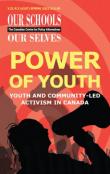Youth activists and youth activism are sometimes characterized as naive participants or idealistic dreamers, caught up in unrealistic expectations and agendas. Youth engagement is minimal at best and apathetic at worst: a sheltered perspective of real community struggles and issues. What Power of Youth has set out to do is prove that youth activism and activists are more than these flawed descriptions.
The activists who contributed to the latest edition of the Canadian Centre for Policy Alternatives’ journal of education transcend boundaries and use unique experiences of technology and community to inform their roles: they are innovators, they are leaders.
When I first set out to read Power of Youth, I wasn’t sure what to expect — was this a teacher’s aid for more inclusive education or was it an academic guide to theoretical solutions proposed by youth activists? Turns out it was neither.
The journal is both inspiring personal experiences and pragmatic prescriptions of a solution. Some tell ways in which groups and allies are working together on correcting a problem, while others story-tell about real-world situations. Edited by Brigette DePape, the journal features notable activists such as: Fiona Rayher and Tara Mahoney of Gen Why Media, Harsha Walia, Ben Powless and rabble.ca editor Derrick O’Keefe.
Each essay sets out to define a problematic area affecting Canadians — record high youth unemployment, out-of-control student debt, disproportionate poverty and homelessness for Indigenous Canadians, climate injustice and missing and murdered indigenous women. Through self-reflection, critical analysis and plain honesty, youth and community-based activists dissect the issues beyond those of their age to enable knowledge for all of our country and communities to do more.
Michael Wheeler explored this ‘do more’ attitude in “Creating Political Theatre Through the Internet” discussing his, and co-founder Simon Rice’s, combination of theatre, social media and activism to create an “open source theatre project,” Praxis Theatre. Wheeler proudly declares “Art matters. It can affect change.” Their G20-themed play You Should Have Stayed Home may have played a positive role in several G20 rulings, creating change through artistic expression.
“A Vision of Tarmageddon: The tar sands and our future” is a sobering portrayal of harsh statistics set in real life. Ben Powless’ candid retelling of his trip to Fort McMurray to visit and photograph the communities affected by the tar sands. His depiction of the massive tailing ponds polluting toxic chemicals into traditional hunting grounds and the community that faces cancer rates 30,000 case higher than normal is absolutely stunning — a standout amongst the collection.
Bridget Tolley, Sue Martin and Kristen Gilchrist use the personal as the political and take the stance of introducing themselves before introducing their activism. The technique is raw yet comforting and forced me to view the writers as faceted individuals who had experienced both pain and joy, sadness and elation, and it was those experiences that informed their activism.
Tolley, Martin and Gilchrist founded Families of Sisters in Spirit — almost immediately after the now defunct Sisters in Spirit — refusing to give up the fight of missing and murdered indigenous women, believing they can function (better) without government money and presence. Their stories captivated me, instilling a connectedness that is paramount in activism — an urge to work together and promote solidarity amongst everyone.
Power of Youth is more than just a book about youth activism, it is a testament to all generations of activists who continue to fight, informed by passion and experience and unified by practicality and accountability.
Krysta Williams exemplifies this idea with her discussion of sustainability as “an investment in a long term relationship with Indigenous community, and a long term vision of what we’re trying to create when engaged in any kind of ‘activism’.” To me Williams’ words rang true because sustainability is not just about greening coffee-shops or driving electric cars, it is about creating deep connections rooted in community and upholding and valuing everyone’s voice.
Taking a large concept like undoing the systematic oppressions rooted in historic and ongoing colonization seems utterly defeating and unrealistic, right up until Williams’ idea of sustainability in “Indigenous You Women: Speaking our truths, building our strengths.” It echoes the mentality that we’re all in it together, and once you’re beside someone, you don’t feel so alone and the fight doesn’t seem so alienating.
If the goal behind Power of Youth was to empower and enable anyone — youth or not; activist or not — and promote engagement over apathy and accessible conversation over academic elitism: they have succeeded. The takes the stigmas and realities of youth activism and combines them together to create a book that is one part idealistic dreamer and one part pragmatic guide to impending solutions and next-steps, laced with progressive tools and success. After all, isn’t that the best way to create, with your head in the clouds and feet firmly rooted in the ground?—Kaitlin McNabb
Kaitlin is rabble’s Babble Book Club moderator and a regular contributor to the book lounge.
Community supported media requires community members. . .join our membership drive and please become a member today!



